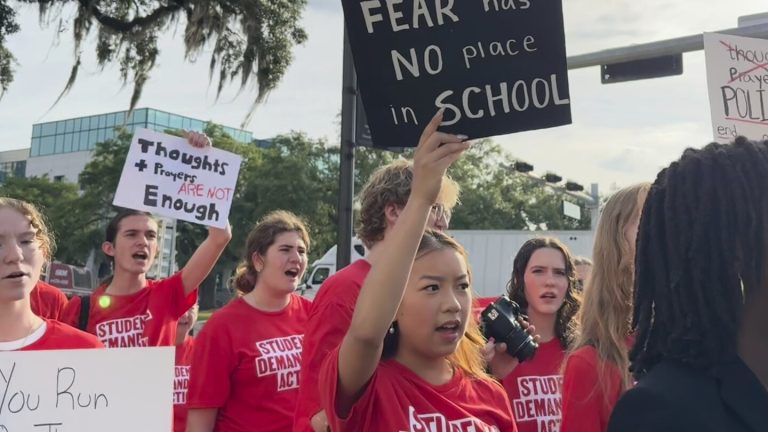TALLAHASSEE, Fla. (AP) — Florida students who were traumatized by the 2018 Parkland school shooting — and last week’s deadly shooting at Florida State University — are urging lawmakers in the Republican-controlled statehouse not to roll back gun restrictions they passed in the wake of the killing at Marjory Stoneman Douglas High School.
Gun rights activists have been fighting to unravel the 2018 law since it was passed, including a provision that raised the state’s minimum age to buy a gun to 21. Gov. Ron DeSantis and some Republican lawmakers have argued that if an 18-year-old Floridian can serve in the military, they should be able to purchase a firearm.
In the wake of the FSU shooting, student activists — including double mass-shooting survivors — are walking the halls of the Capitol building, lobbying lawmakers to support gun control policies in the final two weeks of the legislative session, which is scheduled to end May 2.
“No one should ever have to experience a school shooting — let alone two — just to have to beg lawmakers to care enough to stop the next one,” said Stephanie Horowitz, who was a freshman at Marjory Stoneman Douglas High School in 2018 and is now a grad student at FSU.
Two people were killed and six others injured in the shooting last Thursday that terrorized FSU’s campus, about a mile (1.6 kilometers) from the state Capitol. Logan Rubenstein, a 21-year-old junior at FSU, says it could have been much worse, if a bipartisan coalition of lawmakers hadn’t taken action after Parkland.
Rubenstein believes gun restrictions passed by the Legislature in 2018 helped prevent the FSU shooter from carrying out more carnage — like what happened at Rubenstein’s high school in Parkland seven years ago.
Rubenstein was in eighth grade at nearby Coral Springs Middle School when a 19-year-old gunman armed with an AR-15-style rifle killed 17 people and injured 17 others at Marjory Stoneman Douglas High School.
Investigators say the suspect in the FSU shooting, a 20-year-old student at the university named Phoenix Ikner, armed himself with a handgun that was the former service weapon of his stepmother, a local sheriff’s deputy. Under the state’s current laws, he couldn’t legally buy a rifle from a federally licensed dealer.
“The law that we passed after Parkland worked,” Rubenstein said. “Because if he was able to buy an AR-15, body armor and a bump stock and unlimited ammo, how much more deadly would it have been?”
About three weeks before the FSU shooting, the Florida House passed a bill that would lower the state’s minimum age to buy a gun to 18. The proposal had stalled in the state Senate even before the FSU shooting, and it appears even less likely to advance now.
Still, speaking at a rally with student activists on the steps of Florida’s historic old Capitol on Wednesday, Democratic state Sen. Tina Polsky said she is not letting up. Polsky, whose district includes Parkland, is among the Democrats who have sponsored gun control bills this session that never got a hearing in the Capitol, where Republicans hold a supermajority in both chambers.
“I am begging them to do something like we did after the horrific Parkland shooting,” Polsky said. “I don’t know if it’s going to happen. But we will continue to fight.”
Before the students headed back into the halls of the Capitol to lobby lawmakers and their aides on Wednesday, Democratic state Rep. Anna Eskamani told them not to let the regular rhythm of Tallahassee’s legislative process slow them down.
“They have the power to waive the rules and agenda whatever bills they want,” Eskamani said of Republican leaders. “We’re not trying to make this political. We are trying to save lives.”
___ Kate Payne is a corps member for The Associated Press/Report for America Statehouse News Initiative. Report for America is a nonprofit national service program that places journalists in local newsrooms to report on undercovered issues.


